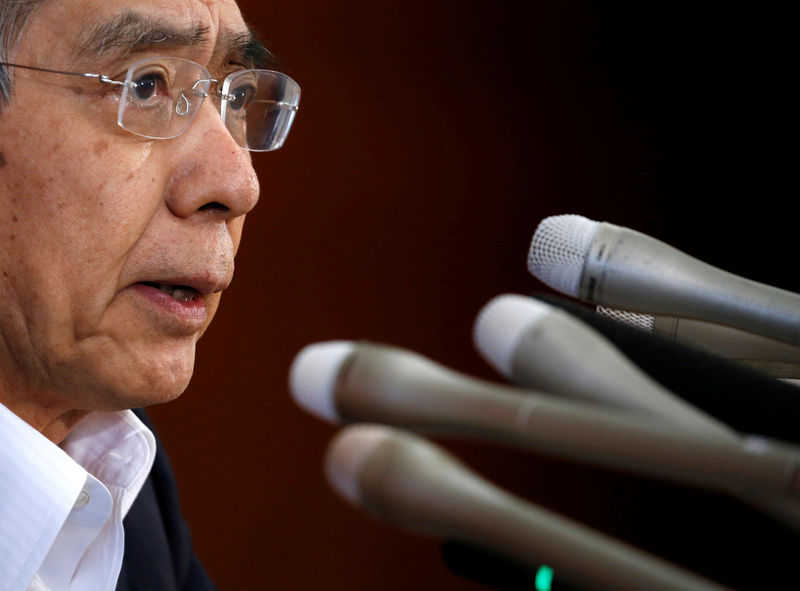By Leika Kihara
TOKYO (Reuters) - The Bank of Japan expanded stimulus on Friday by doubling purchases of exchange-traded funds (ETF), yielding to pressure from the government and financial markets for bolder action, but disappointing investors who had set their hearts on more audacious measures.
The central bank, however, said it will conduct a thorough assessment of the effects of negative interest rates and its massive asset-buying program in September, suggesting that a major overhaul of its stimulus program may be forthcoming.
BOJ Governor Haruhiko Kuroda said the bank was conducting the review not because its policy tools have been exhausted but to come up with better ways to achieve its 2 percent target - keeping alive expectations of further monetary easing.
"I don't think we've reached the limits both in terms of the possibility of more rate cuts and increased asset purchases," Kuroda told reporters after the policy meeting.
"We will of course consider what to do in terms of monetary policy steps, based on the outcome of the assessment."
At the two-day rate review that ended on Friday, the BOJ decided to increase ETF purchases so its total holdings increase at an annual pace of 6 trillion yen ($58 billion), up from the current 3.3 trillion yen. The decision was made by a 7-2 vote.
But the BOJ maintained its base money target at 80 trillion yen, as well as keeping to the existing pace of purchasing other assets including Japanese government bonds.
It left unchanged the 0.1 percent interest it charges on a portion of excess reserves that financial institutions park with the central bank.
The dollar fell more than a full yen on Friday at one point to as low as 102.825 and the Nikkei average tumbled nearly 2 percent, after the BOJ's decision fell short of expectations.
The benchmark 10-year JGB yield rose briefly to minus 0.170 percent, its highest since June 24, as the BOJ held off on expanding bond purchases.
"The BOJ did not live up to expectations," said Norio Miyagawa, senior economist at Mizuho Securities. "Increasing ETF purchases makes no contribution to achieving 2 percent inflation. The BOJ won't admit it, but it has reached the limits of quantitative easing and negative rates."
By coordinating its action with the government's promised $272 billion economic stimulus spending package, the BOJ likely aimed to maximize the effect of its measures on an economy that is struggling to escape decades of stagnation.
"Japan is conducting a powerful mix of flexible fiscal policy and quantitative easing," Kuroda said. "The government's stimulus package helps reinforce this drive and is timely in achieving sustainable growth with price stability."
MORE STIMULUS COMING?
The BOJ maintained its rosy inflation forecasts for fiscal 2017 and 2018 in a quarterly review of its projections. It also left intact its timeframe for hitting its 2 percent price growth target, but warned that heightening uncertainties could cause delays.
Kuroda justified Friday's slight easing as aimed at preventing external headwinds, such as weak emerging market demand and Britain's vote to leave the European Union, from hurting business and household confidence.
But analysts say pressure from the government and markets was largely behind the move. Japan's economy minister lobbied for more BOJ action in the wake of Prime Minister Shinzo Abe's announcement of a bigger-than-expected 28 trillion yen stimulus package on Wednesday.
"The BOJ seems to have had no choice but to ease policy this time as markets had factored in fresh stimulus measures significantly. In addition to that, there seems to have been political pressure," said Tsuyoshi Ueno, senior economist at NLI Research Institute.
Worried about their dwindling policy options, some BOJ policymakers have expressed doubts over the feasibility of expanding an already massive stimulus program that has failed to boost inflation.
Such concerns may be addressed when the BOJ conducts an assessment of the effect of its current policies at its next rate review on Sept. 20-21, though Kuroda ruled out the chance of modifying the price target or the timeframe for hitting it.
He stressed that there was still more room to deepen negative rates or expand bond purchases. Some analysts say the review may lead to more radical steps being proposed.
"What's noteworthy is that the BOJ has promised to review the effects of its policy at its next meeting, keeping alive expectations of further easing," said Shunsuke Yamada, chief Japan currency strategist at Bank of America Merrill Lynch (NYSE:BAC).
"This makes the next meeting very important. The yen is likely to be volatile until then."
